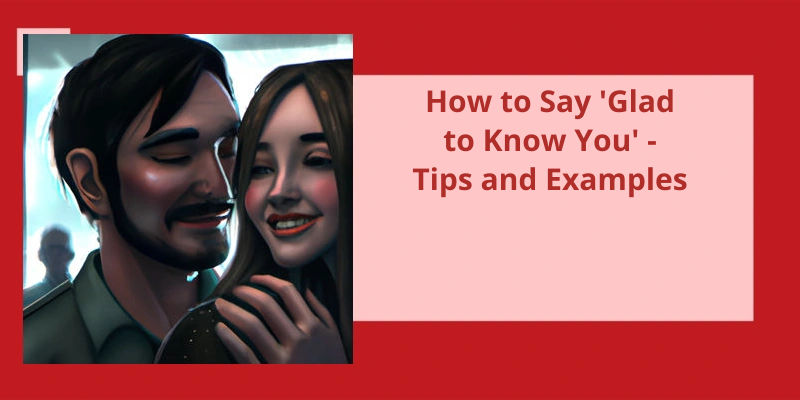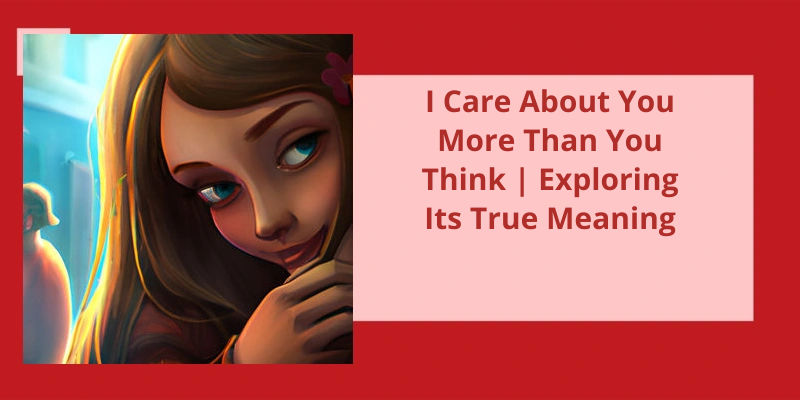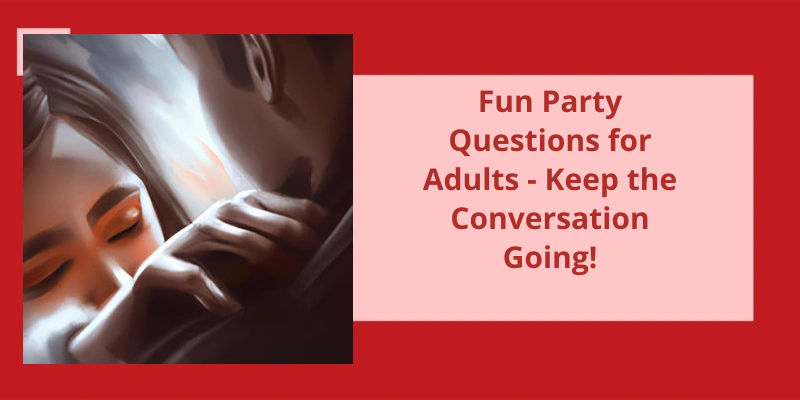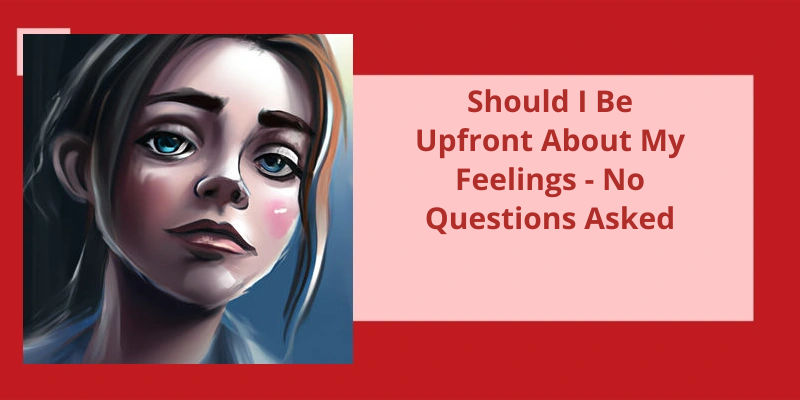In the world of social interactions, meeting new people can be exciting and nerve-wracking at the same time. When it comes to introducing yourself to someone, saying "nice to meet you" has become the default phrase for many. However, using this clichéd phrase might not always convey your true sentiments, especially when you're genuinely happy to meet the person. Fortunately, there are plenty of ways to express your pleasure in making someone's acquaintance without resorting to the overused phrase. In this article, we will explore some alternative ways of saying "nice to meet you" that are sincere, engaging, and memorable. Whether you're attending a business conference, social gathering, or meeting someone for the first time, these phrases will help you make the right impression and start your conversation off on the right note.
What Does Glad to Meet You Mean?
The phrase “glad to meet you” is a common idiom used to express pleasure or satisfaction when meeting someone for the first time. It’s often used as an ice-breaker or a way to show that you’re interested in getting to know the other person. The phrase is considered polite and socially acceptable in most cultures and is often used in formal settings such as business meetings and interviews.
The use of the past tense verb “glad” in the phrase is significant, as it indicates that the speaker has already formed a positive impression of the other person. This could be based on prior knowledge of the other person, personal recommendations from others, or simply a sense of anticipation about the upcoming meeting. The phrase is often accompanied by a smile, a handshake, or a nod to further emphasize the positive sentiment.
This allows the other person to respond in kind, further building the rapport between the two parties. The use of the phrase is particularly effective in situations where the two parties are meeting for the first time and may be apprehensive or nervous about the encounter.
It’s a socially acceptable form of greeting in most cultures and is often used in formal and informal settings alike. The phrase is accompanied by introductions and gestures of friendliness, and it serves as an effective ice-breaker to build rapport and relationships.
Etiquette and Etiquette Tips for Using “Glad to Meet You” in Different Situations (e.g. Business Meetings, Social Events, First Dates)
- Always use the phrase “glad to meet you” as a polite greeting when first meeting someone.
- In business meetings, be sure to introduce yourself and shake hands with everyone present before using the phrase.
- At social events, it’s appropriate to use “glad to meet you” after being introduced by a mutual friend or host/hostess.
- On first dates, using “glad to meet you” is a great way to start the conversation and express your interest in getting to know the other person.
- Remember to use a friendly tone and make eye contact when saying “glad to meet you” to show sincerity.
- If you aren’t sure if you’ve met someone before, it’s better to err on the side of caution and use the phrase anyways.
- Try to avoid using “glad to meet you” as a goodbye, as it can come off as insincere and dismissive.
Now that we know the potential negative connotations of saying “nice to know you,” it’s important to consider alternative ways to express gratitude or appreciation when meeting someone new or catching up with an old acquaintance. While “knowing” versus “to know” may not make a significant difference in the phrase, it’s still worth being mindful of our language choices to ensure we’re communicating our intended message clearly.
Is It Right to Say Nice to Know You?
In social situations, it’s important to be mindful of the phrases that we use. While “nice to know you” may seem like a harmless remark, it’s the potential to come across as insincere or even callous. This is especially true if were speaking to someone who weve just met and don’t have a personal relationship with yet.
If the person were speaking to has no plans to leave our lives or isn’t dying, the comment can seem out of place. This can lead to an uncomfortable silence or a sense of disconnection between us and the other person. To avoid this, it’s best to use more appropriate phrases such as “It’s great to meet you” or “Thank you for taking the time to speak with me.”
It can be a sincere remark when used in the right context. If were speaking to someone who’s leaving our lives or has passed away, saying “nice to know you” can be a heartfelt way of expressing our gratitude for the time we spent with them. In these situations, “knowing” is often used instead of “to know” to convey a stronger emotional connection.
If were unsure whether it’s appropriate or not, it’s best to err on the side of caution and use a more neutral phrase. This can prevent any misunderstandings or uncomfortable moments. In any social interaction, our words have the power to affect others, so it’s important to use them wisely.
It’s best to be mindful of the context and use more appropriate language that conveys sincerity and respect. Whether were meeting someone for the first time or saying goodbye to a loved one, our words have the ability to impact those around us. By being conscious of the messages we convey, we can create more positive and meaningful interactions with others.
Now that we’ve covered the appropriate responses to “Nice to make your acquaintance”, let’s dive into some other common phrases that are used in social situations.
How Do You Respond to Nice to Make Your Acquaintance?
” It’s important to always respond to a greeting with a positive tone to create a good first impression and show that you’re friendly and polite.
If you want to take the conversation further, you can ask a follow-up question such as “So what brings you here today?” or “What do you do for a living?”. This shows interest in the other person and can lead to a more meaningful conversation. It’s always a good idea to have a few open-ended questions in mind before going into a social situation, so that you can keep the conversation flowing.
If the person you’re talking to seems particularly interesting, you can also suggest exchanging contact information or meeting up again in the future. This can be a great way to make new friends or professional connections.
However, if youre in a more formal setting or meeting someone in a professional capacity, you may want to stick to a more conservative response such as “It’s a pleasure to make your acquaintance as well” or “Thank you for the introduction.”. This shows that you’re respectful and professional.
Overall, responding to “Nice to make your acquaintance” should always be done with a positive, friendly tone and it’s always a good idea to have a few follow-up questions or conversation starters in mind. Whether youre meeting someone for the first time at a social event or in a professional setting, a good first impression can go a long way in building strong relationships and making lasting connections. So always be ready to respond with a smile and a friendly greeting!
Making a good first impression is essential in any social interaction. After introducing yourself, the next step is to acknowledge the person you’re speaking with and express your pleasure in meeting them. While “nice to meet you” is a common phrase, there are other ways to convey the same sentiment. In this article, we’ll explore some alternatives to “nice to meet you” that can make a lasting impression.
How Do You Say Glad to Know Someone?
Making a new acquaintance can be a wonderful experience, and it’s always polite to express your positive feelings about meeting someone new. While the classic phrase “nice to meet you” is a reliable standby, it can feel a bit overused or even insincere in certain social situations. Fortunately, there are plenty of other ways to express that you’re glad to have met someone, whether it’s with a more formal or casual tone.
One great option for expressing your pleasure in meeting someone new is to say “its great connecting with you”. This phrase emphasizes the idea that you feel like you’re beginning a connection with someone, rather than just having a one-time meeting. This sentiment can be especially appropriate in professional or networking settings, where building relationships is key.
“Lovely to meet you” is another variation on this theme that can convey a sense of affection and admiration. This phrase has a slightly more informal feel than “pleased to meet you”, and may be better suited to social situations where you want to signal your appreciation for the other person’s personality or style.
If you’re looking for a more formal way to express your pleasure in making someone’s acquaintance, you might try saying “how do you do?”. This phrase is especially common in British English, and is often used as a polite greeting when meeting someone for the first time. It can convey respect and formality, while still expressing a sense of warmth and enthusiasm.
Finally, for an especially formal approach, you might choose to say “delighted to make your acquaintance”. This phrase is quite formal and may be best reserved for very formal or professional settings, but it can be a great way to convey genuine pleasure at meeting someone in a way that emphasizes respect and admiration.
There are many ways to express gratitude and appreciation after a conversation, and one of the most common expressions is “it was a pleasure speaking to you.” However, there are alternative phrases that can be used to convey similar sentiments without sounding repetitive. These phrases can add variety and a personal touch to your conversations.
What’s Another Way of Saying It Was a Pleasure Speaking to You?
As humans, we’re social creatures, and communication is fundamental to us. In our daily lives, we interact with people often, whether it’s friends, family members, colleagues, or even strangers. Sometimes, we need to show appreciation in our interactions, especially when weve had great conversations. One way of expressing this gratitude is by saying, “it was a pleasure speaking with you.”
However, there are several other ways of saying this that are just as effective. For instance, when you want to express that you enjoyed the conversation, saying, “it was great talking to you,” could be a good alternative to “it was a pleasure speaking with you.”. This expression shows that you genuinely appreciated the conversation you’d with the person.
Similarly, “it was nice to meet you,” could replace “it was a pleasure speaking with you” after meeting someone for the first time. It’s a polite and courteous way of saying that you enjoyed meeting the person and look forward to more interactions in the future.
The phrase communicates that you enjoyed the conversation, and you believe it was productive or valuable.
Each of these expressions has it’s unique use and could be effective, depending on the circumstance. So, the next time you want to show appreciation after a conversation, consider trying out one of the alternatives.
Other Phrases for Showing Appreciation in Different Contexts, Such as “Thank You for Your Time” or “I Appreciate Your Input.”
- Thank you for your help.
- Thanks for the feedback.
- I’m grateful for your support.
- Your assistance is greatly appreciated.
- Thanks a lot for your contribution.
- Many thanks for your kind words.
- Your help means a lot to me.
- I’m thankful for your presence.
- Thanks for taking the time to help out.
- Thanks for being there for me.
Source: It Was a Pleasure Speaking With You & Talking To You
Conclusion
However, there are many other ways to express your gratitude for meeting someone new. Saying "I'm glad to meet you" or "Lovely to meet you" are great alternatives that show enthusiasm and sincerity. "How wonderful to meet you" and "It's a pleasure to meet you" express excitement in meeting the person and acknowledge the pleasure of discussing new ideas and learning about different perspectives. "Pleased to make your acquaintance" and "It's an honor to meet you" are more formal and professional ways of expressing gratitude for meeting someone for the first time. These phrases demonstrate respect and admiration for the individual and their accomplishments.






